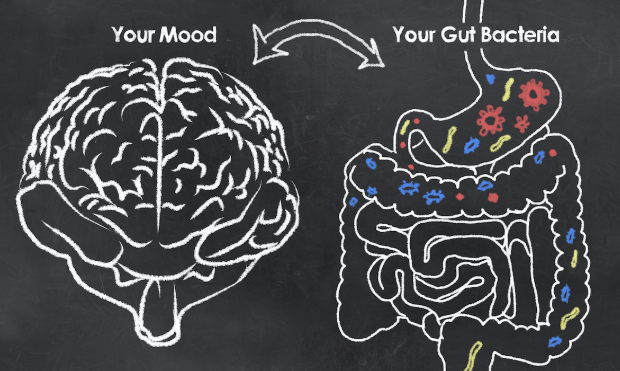Brain Gut Connection

For decades, doctors and researchers thought that anxiety and depression contributed to irritable bowel syndrome (IBS), constipation, diarrhea, bloating, and many other stomach problems. However, it turns out it may be the other way around. Researchers have found evidence that irritation in the gastrointestinal system sends signals to the central nervous system (CNS) that triggers mood changes. Our brain and gut produce neurotransmitters, but the most common neurotransmitters produced in the gut are serotonin and gamma-aminobutyric acid (GABA). Serotonin makes us happy and helps control our body clock, while GABA helps control feelings of fear and anxiety.
So, what can you do to keep your brain and gut happy and healthy? The key to a healthy gut is probiotics and prebiotics. Probiotics are live strains of beneficial bacteria that help fill your gut with healthy microorganisms. In some cases, probiotics have been shown to improve symptoms of depression, stress, and anxiety. In order to keep a healthy gut flora, you have to feed it the good gut bacteria. This is where prebiotics come into play. Prebiotics are fibers that are not digestible by humans but are fermented by your gut bacteria. Most people take probiotics and prebiotics in supplement form; however, there are numerous food sources that provide probiotics and prebiotics.
The most important food groups to look for when improving your gut flora are omega-3 fats, fermented foods, high-fiber foods, polyphenol-rich foods, and tryptophan-rich foods. Omega-3 fats are commonly found in fatty fish such as salmon and sardines. Fermented foods include sauerkraut, kimchi, kefir, and kombucha. High-fiber foods include whole grains, nuts, seeds, fruits, and vegetables, which may also contain prebiotic fiber. Polyphenol-rich foods include cocoa, green tea, olive oil, and coffee. Tryptophan-rich foods include turkey, eggs, and cheese. Try incorporating some of these probiotic and prebiotic-rich foods into your diet, and I’m sure both of your brains will thank you.
Sources:
John Hopkins Medicine, The Brain-Gut Connection. Retrieved from https://www.hopkinsmedicine.org/health/wellness-and-prevention/the-brain-gut-connection
Robertson, R. (2018, June 27). The Gut-Brain Connection: How it Works and The Role of Nutrition. Retrieved from https://www.healthline.com/nutrition/gut-brain-connection
